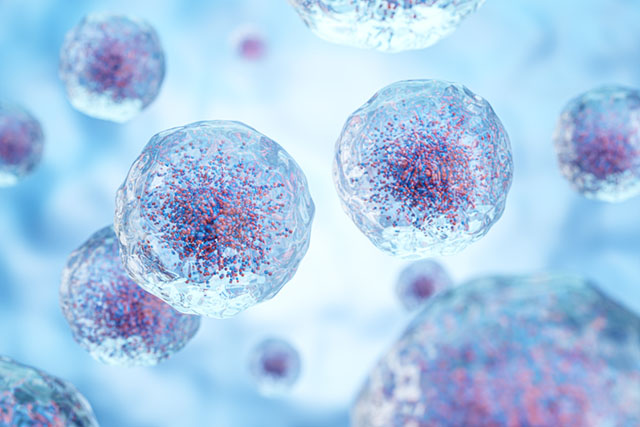The Rutgers Cancer Institute of New Jersey Clinical Research Program is organized based on disease teams, mainly related to specific diagnoses. Some of the Disease Specific Groups are more thematic: Early Drug Development (Phase 1), Precision Medicine, and Cellular Therapies. Each disease team reviews available clinical trials or develops their own trials to meet the clinical needs of patients within their area of expertise (for example, breast cancer) at Rutgers Cancer Institute and RWJBarnabas Health sites for all patients across the system. The DSG trial portfolio covers the majority of situations for our patients and meets the needs of cancer patients in our catchment area, which is the entire state of New Jersey. DSGs work closely with our Community Outreach and Engagement team to address the trial needs of underrepresented patient groups across the state. Learn more about the Clinical Research Program of each Disease Specific Group below.
Disease Specific Groups
Gastrointestinal Oncology Disease Specific Group
 Program Leader: Howard S. Hochster, MD, FACP
Program Leader: Howard S. Hochster, MD, FACP
The Gastrointestinal Cancers Disease Specific Group (GI DSG) is dedicated to clinical and translational research in all tumors of the GI tract. We conduct clinical trial on cancers of the entire GI tract including esophageal cancer, gastric and G-E junction cancers, biliary tract, hepatocellular carcinoma, pancreas, small bowel, colon, rectal and anal cancer. In 2022 the GI DSG ran approximately 20 trials and accrued 100 patients to therapeutic trials. We also work with scientists at Rutgers Cancer Institute of New Jersey, Princeton University, other Cancer Centers and industry on treatment trials and on non-treatment trials understanding the biology of GI Cancers.
The group is composed of Medical, Surgical and Radiation Oncologists who work closely in a multi-disciplinary fashion. We have special interest in pancreatic cancer, colon cancer and peritoneal carcinomatosis, and the use of Precision Medicine to direct therapies for novel molecular subsets. We have active trials in these areas at all times and surgical trials involving surgery and HIPEC and liver directed therapies. We always have late-line colon cancer studies focused on patients who have previously received the standard drugs. We are working closely with the Cellular Therapies DSG to develop cell therapy for solid tumors of the GI tract. Additionally, we have a strong interest in developing blood-based DNA testing for tumor prognosis, treatment and for microbiome research. We work closely with investigators at Rutgers Center for Advance Biotechnology and Medicine, and Rutgers Cancer Institute to understand the microbiome and how it influences cancer growth and control. We are conducting microbiome directed treatment trials.
- Learn more about our Gastrointestinal Oncology Program.
- Find GI Cancer Clinical Trials.
- To request an appointment, call 844-CANCERNJ.
Genitourinary Oncology Disease Specific Group
 Program Leader: Biren Saraiya, MD
Program Leader: Biren Saraiya, MD
The Genitourinary Cancers Disease Specific Group (GU DSG) is dedicated to advancing prevention, screening and treatment of all GU cancers. We work across the cancer continuum and across multiple disciplines to improve outcomes for our patients. We conduct clinical trials on cancers of the entire GU tract including prostate, bladder, kidney, penile and testicular cancers. We offer trials of first-in-human (phase 1) through randomized phase 3 studies. We offer trials on improving screening and improving cancer treatments by offering advanced surgical and radiation techniques and medical therapies. We also work with our colleagues from the School of Public Health, School of Nursing and School of Communication at Rutgers University to improve care delivery of cancer patients with communication interventions to improve palliative care outcomes. We work with our colleagues and investigators at Rutgers Center for Advanced Biotechnology and Medicine to understand the microbiome and its impact on outcomes for bladder cancer surgery.
In 2022, the GU DSG ran approximately 20 trials and accrued 60 patients to therapeutic trials. Our team of medical, surgical and radiation oncologists are actively collaborating with each other and across the United States as part of cooperative groups, the Hoosier Cancer Research Network, Big Ten Cancer Research Consortium and pharmaceutical companies. We train future investigators in medical, urological and radiation oncology. We welcome anyone interested in further collaboration in advancing patient care reach one of our physicians in the link below. We also welcome scientific inquiries to any one of us directing at the contact information below.
- Learn more about our Urologic Oncology Program, Prostate Oncology Program
- Find GU Cancer Clinical Trials.
- To request an appointment, call 844-CANCERNJ.
Gynecologic Oncology Disease Specific Group
 Program Leader: Aliza Leiser, MD, FACOG
Program Leader: Aliza Leiser, MD, FACOG
The Gynecologic Disease Specific Group is comprised of a multidisciplinary group of gynecologic oncologists, pathologists, radiologists, radiation oncologists, nurses, and scientists. We are committed to offering a diverse array of clinical protocols that encompass the spectrum of gynecologic malignancies. These include ovarian cancers, uterine cancers, cervical cancers, as well as rarer histologies. We participate in trials through groups such as the NRG Oncology Group and Gynecologic Oncology Group (GOG) Foundation as well as industry sponsored trials. A unique feature of our DSG is that all gynecologic oncologists are members of the group and enroll patients on clinical trials. This means that the patient is able to continue care with their surgeon who can lead them through their participation in a clinical trial. We have monthly DSG meetings across all RWJBarnabas Health partner sites where clinical trial portfolios, patient accruals and safety data are reviewed. Our team members hold key roles in regional and national organizations, such as Society of Gynecologic Oncology, Gynecologic Oncology Group, and Big Ten Cancer Research Consortium. We also actively participate in the Precision Medicine Oncology group at Rutgers Cancer Institute of New Jersey and offer personalized treatment options based on molecular tumor profile.
The past few years have been a very exciting time for exploring new treatments for gynecologic malignancies. We have seen this lead to an exponential increase in the number of trials and enrolled patients at Rutgers Cancer Institute. One example is the incorporation of checkpoint inhibitors. Trials for both endometrial and ovarian cancers are testing the use of this treatment as an addition to or alternative to standard of care chemotherapy. We recently participated in a national clinical trial using checkpoint inhibitor for endometrial cancer, where interim analysis showed a possible survival advantage. Another exciting therapy is the testing of antibody drug conjugates (ADC). A current trial is using a first in class ADC for platinum sensitive recurrent ovarian cancer. Cell cycle inhibitors are an encouraging modality for gynecologic tumors that have a high degree of replication stress. These include high-grade uterine and ovarian cancers, and a current trial is researching the effectiveness of these inhibitors for these tumor types. We are strong believers that clinical trials should be considered throughout the care of a gynecologic cancer patient. This is true whether it is a newly diagnosed patient, someone seeking a maintenance therapy or a patient with recurrent disease. We are dedicated to ensuring that all our patients have equitable access to clinical trials and to outstanding care.
- Learn more about our Gynecologic Oncology Program.
- Find Gynecologic Cancer Clinical Trials.
- To request an appointment, call 844-CANCERNJ.
Hematologic Malignancies Oncology Disease Specific Group
 Program Leader: Matthew Matasar, MD, MS
Program Leader: Matthew Matasar, MD, MS
The Hematologic Malignancies Disease Specific Group (HEME DSG) is focused on the care of patients facing a diagnosis of various blood disorders. Blood disorders include illnesses of the bone marrow (the ‘factory’ for our blood) and cancers of the immune system. This includes cancers such as leukemia, lymphoma, multiple myeloma and other plasma cell cancers, myelodysplasia and myeloproliferative disorders. Caring for patients with such a diverse range of illnesses requires both breadth and depth of expertise, and the care teams within our group offer tremendous expertise in the diagnosis, treatment, and research in these fields. This expertise is at its heart multi-disciplinary, and we fully embrace the spirit of teamwork required to support patients and their loved ones through this journey. Excellent physicians, nurse clinicians and advanced practice providers, nurse navigators, social workers, dieticians, and genetic counselors work together both at Rutgers Cancer Institute of New Jersey and across RWJBarnabas Health to provide patients the holistic care that is so critical to achieving the best outcomes.
Increasingly, cutting-edge care of blood disorders requires consideration of the newest treatments such as cellular therapy, including stem cell transplantation as well as chimeric antigen receptor-modified T-cell (CAR-T) therapy. Our Blood and Marrow Transplant Program, led by Dr. Ira Braunschweig, offers tremendous expertise in the use of both FDA-approved and next-generation cellular therapies. Indeed, the Division is leading the way not only in treating patients with the best treatments currently available, but also in leading research to redefine the standards of care. Clinical research into more effective and less toxic treatments for patients with a diagnosis of a blood disorder is at the core of the Division’s mission, and we are leading pivotal clinical trials across the spectrum of illnesses faced by our patients to work towards achieving our mission of ending blood cancers and blood disorders, period. Please reach out if interested in a consultation with one of our experts, either in person or via telemedicine.
- Learn more about our Blood and Marrow Transplant Program, Leukemia/Lymphoma/Hematologic Malignancies Program.
- Find Hematologic Cancer Clinical Trials.
- To request an appointment, call 844-CANCERNJ.

